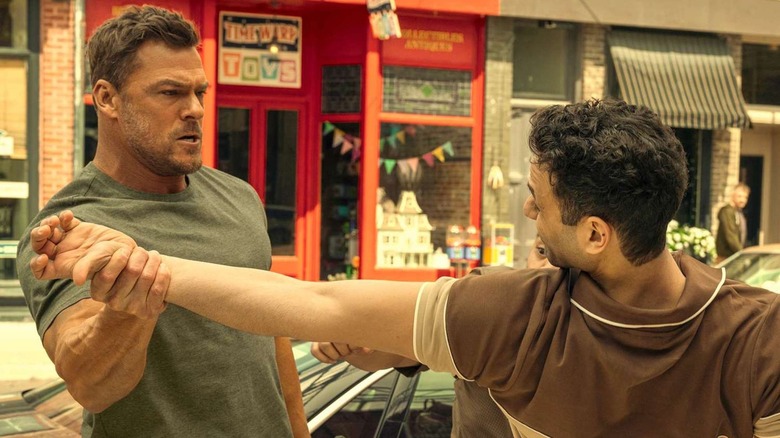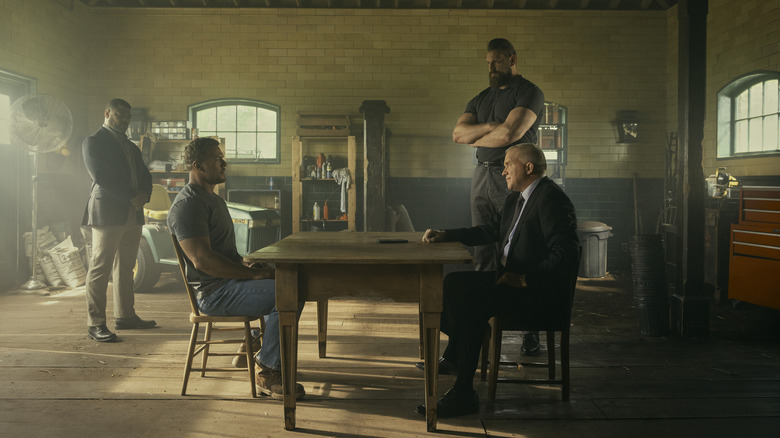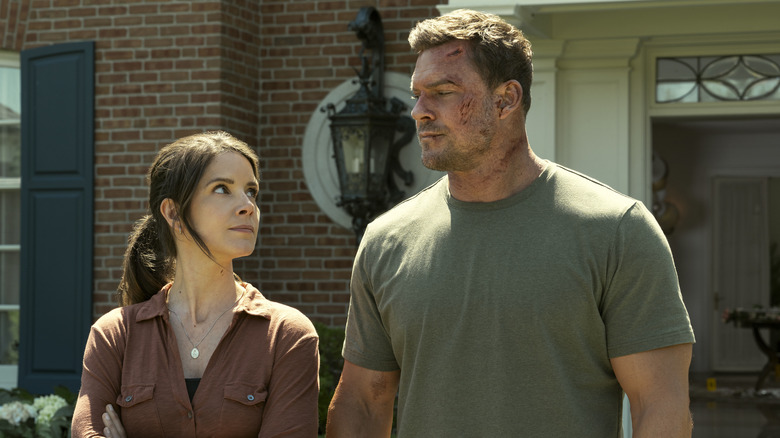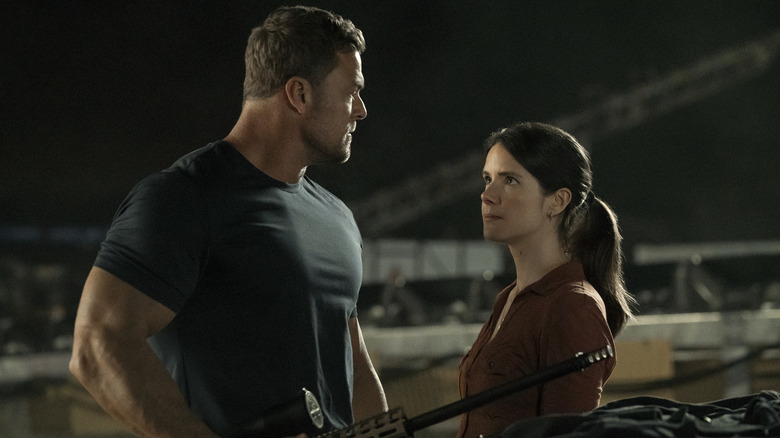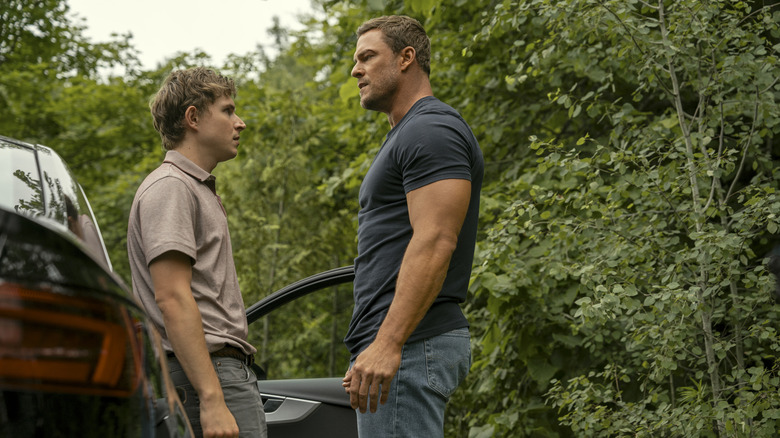What Jack Reacher Author Lee Child Loves About Alan Ritchson's Performance [Exclusive Interview]
This post contains spoilers for "Reacher" season 3, episode 1.
It's always a delight when something immensely popular is also extremely good, and that's the case with Lee Child's Jack Reacher book series. Before stepping away and handing the reins over to his brother a few years ago, Child wrote a couple dozen novels (and a short story collection) following the adventures of the laconic former military cop who now travels the country as a homeless vagrant, using his giant muscles and equally giant intellect to solve problems (and break skulls) whenever he comes across them. Call them "airport novels" or "beach reads" if you must, but Child's slick but understated prose, wry sense of humor, and finely crafted mysteries showcase a novelist who has turned his skills toward a very simple goal: giving the people what they want. And boy, does his work deliver.
And now, the Jack Reacher character lives on in Prime Video's "Reacher" streaming series, an extremely entertaining action extravaganza with a third season that's a proper return to form following a lackluster sophomore effort. I sat down with Child over Zoom ahead of the premiere of "Reacher" season 3, which is based on his book "Persuader," and we chatted about writing action, the reaction to the recent books now that his brother has taken over the series, and the one often-overlooked element of the Jack Reacher character that actor Alan Ritchson completely understands.
Note: This interview has been lightly edited for clarity and brevity.
Lee Child knew he was taking a risk with the structure of Persuader
"Persuader" is my favorite Jack Reacher book, and I'll never forget the opening sequence where we learn the truth about the kidnapping and how far you bury it into the narrative, and the show maintains that — they do a good job burying the big reveal, as well. So I would love to know how you first devised the decision to bury the reveal of the kidnapping until 100 pages in.
Yeah, I was very conscious of taking a risk because it was the seventh book and the audience was growing all the time, which meant that each particular book, there would be a big margin of brand new readers coming to each new title, and it was a risk to conceal the truth for so long. What opinion would the new readers have of Reacher if they thought this was real? It was a risk. I remember it well. I seemed to get away with it, and it plays really well on the screen as well, I think. I mean, obviously in terms of minutes, the reveal comes a bit quicker than it does in the book, but they carry it off really well. But after the first two seasons, I think returning viewers are going to be not too worried about it. But new viewers, yeah, they're going to face the same thing as the book readers: "Is this guy okay or not?"
My wife watched the episode with me and she was very upset. She was very distressed, saying, "Why did Reacher do that?" So it still works.
The humor in the Jack Reacher books is underrated
In the past, you've spoken about crafting Jack Reacher. You set out to make a character who would be successful, a character who would sell books. And in the past 10 years, ever since I've been reading the books, I've noticed that people from all walks of life would claim him as their own. People who have conservative experience say Jack Reacher's one of theirs, people who are liberal say Jack Reacher's theirs. Does it surprise you to see that Jack Reacher has evolved to mean something to people who have completely divergent beliefs?
Yeah, in a way, it surprises me that he's become as widespread, because you know what show business is like. You cannot possibly predict success. It's always a lucky accident. So I'm very gratified that it spread as far as it did.
In terms of the disparity of people that like Reacher, I'm not that surprised because it's a human quality, I think, that he tries to do the right thing and everybody tries to do the right thing if they can. Their right thing might be different than your right thing, but they're fundamentally trying to do decent behavior in their opinion. So it's a universal trade, I think. Very international as well. Every culture has the same instinct to help if you can, to help somebody out. So I think the universality of it explains why you get all these different types of people liking it.
In your short story, "Second Son," it's a prequel story where we see the teenage Jack Reacher on an Army base in Japan. And reading that short story made me realize that, "Oh, Lee Child is really funny." That short story has a really self-aware style to it where Jack Reacher is having a Jack Reacher adventure even when he is a boy. And it made me realize that you are very much tuned in to the sometimes ridiculous nature of a Jack Reacher story. Do you feel that as a writer, your sense of humor is underrated?
I think, yeah, there is a lot of humor in Reacher. It's a sort of dry, sardonic humor that sometimes goes unobserved. And I think one of the strengths of the Amazon Prime series is that Alan, who really reads the books very carefully, he's noticed it and he mines it and he brings it out to the fore a lot. I'm very happy about that.
But yeah, the humor, if you had [a] sort of word cloud thing for my readers' impressions, I think "humor" would not be a particularly big word, but it's definitely there. And some people notice it, some don't.
Here's Lee Child's favorite action scene in his Jack Reacher books
Of course, your books are known for their detailed, intense action sequences. I believe I'm paraphrasing something you've said in the past about write the boring parts fast and the exciting parts slow. And I'm wondering for people who are listening to this who want to write good action, what have you learned about penning action and pacing it after so many books? Is there a way in? How do you make it compelling on the page?
I think you've got to realize that you build up toward it. It is something that you are aiming for. It is a large major scene, so you cannot duck the issue. You've got to take it head on. You've got to give it all the time, all the space, that it requires. Some of the books — I remember one of them, there's a rifle shot and it's like three pages as the bullet travels through the air. If it's a big scene, you've got to deliver it big. That's the promise that you make, and you've got to live up to that promise.
Do you have a favorite action scene that you've written? I mean, for me, the Jack Reacher versus the truck in the field, I believe it's in "Worth Dying For," is for me the scene where I say, "This is my favorite Jack Reacher action scene." Do you have one that stands out for you?
[laughs] I like that one, too. That's a great one. Let's see, yeah, there's a lot of them. I like the one in ... I set myself a sort of technical challenge in "One Shot," which is that there was going to be the usual body count, but he was not going to actually shoot anybody with a gun. So at one point he crushes somebody to death in a bear hug. I like that. Especially when the guy realizes what is happening.
Lee Child's favorite Reacher book deals with a real-life social issue
Of all the books you've written, is there one that stands out to you, you have a special fondness for? Maybe not the best-selling one, maybe not the one that people bring up the most, but one where you look back at your work and say, "That one's my favorite."
I like "The Midnight Line" from that point of view, it's about the opioid addiction issue, but I wrote it with tremendous sympathy from the addict's point of view. And Reacher is not an addict. Reacher doesn't necessarily have tremendous sympathy for that, but he's a human being and he sees another person in trouble and doesn't comment negatively at all. So I felt that one, it is kind of the one I'm proudest of, in a way. It was a social issue handled through an action thriller that produced a lot of help to people. After what I heard, a lot of people found it helpful and a lot of doctors actually wrote saying, "Thank you for treating it as a human problem rather than a criminal problem."
That one stands out to me too because it's one of the very few problems that Reacher can't punch the way out of. It's one of the very few books where, I don't want to say Reacher's helpless, but he finds himself facing a precipice that he can't scale. And it is generally upsetting as a reader to see Reacher unable to fix that.
Yeah. Quite a few of the latter ones I've tried to introduce that. The one called "Make Me" where it's basically the dark web-based type of things. Reacher understands he can win the battle, but he can't win the war. And that's a little dispiriting to him and it produces a nuance. It's not clean cut. It's not total victory. It's victory today, but the problem will continue tomorrow.
You've been very public about this, a few years ago you handed the books off to your brother and he's been publishing, I think, a few of them now under his name. And I know you said that you wanted the transition to be smooth. You wanted people to be able to continue without issues. I'm wondering, in your opinion, how has the transition gone? Have you noticed any difference in reader reaction, or do you think it's worked?
Reader reaction has been — it's kind of validated the theory I had from the start, which was that I had serious discussions with my publishers from the start about leaving the author name off altogether. This is about a character, we should just call it a Jack Reacher book and have no mention of the author because the central thing is the character himself.
So Andrew has taken over and the reader reaction has been fairly seamless. There's always a few clever dicks who want to point out that, yeah, it's changed. But you get negative comment about anything. The amount is how many negative comments, and there's been very few. And I think it's worked very well.
***
The first three episodes of "Reacher" season 3 are streaming now on Prime Video.
